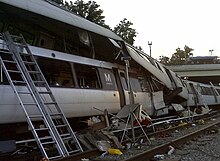
| Home | Sources Directory | News Releases | Calendar | Articles | | Contact | |
Accident
|
|
This article does not cite any references or sources. Please help improve this article by adding citations to reliable sources. Unsourced material may be challenged and removed. (August 2010) |
An accident is a specific, unexpected, unusual and unintended external action which occurs in a particular time and place, with no apparent and deliberate cause but with marked effects. It implies a generally negative outcome which may have been avoided or prevented had circumstances leading up to the accident been recognized, and acted upon, prior to its occurrence.
Experts in the field of injury prevention avoid use of the term 'accident' to describe events that cause injury in an attempt to highlight the predictable and preventable nature of most injuries. Such incidents are viewed from the perspective of epidemiology - predictable and preventable. Preferred words are more descriptive of the event itself, rather than of its unintended nature (e.g., collision, drowning, fall, etc.)
Accidents of particularly common types (auto, fire, etc.) are investigated to identify how to avoid them in the future. This is sometimes called root cause analysis, but does not generally apply to accidents that cannot be deterministically predicted. A root cause of an uncommon and purely random accident may never be identified, and thus future similar accidents remain "accidental."
Contents |
[edit] Definition
Narrowly defined, the designation may refer only to the event, while not including the circumstances (facts surrounding) or results of the event; i.e., 'accident' is constrained to an immediate incident, the occurrence of which results in an unplanned outcome. In common use, however, 'accident' may include the entire interacting circumstantial framework (chance, pre-existing, or uncontrolled dynamically developing conditions; commonplace actions; random time and place; participants; etc.) leading up to, including, and resulting from, the accident's immediate occurrence.
[edit] Types
[edit] Physical and non-physical
Physical examples include, e.g., unintended collisions or falls, being injured by touching something sharp, hot, or electrical, or ingesting poison. Non-physical examples are, e.g., unintentionally revealing a secret or otherwise saying something incorrectly, forgetting an appointment, etc.
[edit] By activity
- Accidents during the execution of work or arising out of it are called work accidents.
- In contrast, leisure-related accidents are mainly sports injuries.
[edit] By vehicle
[edit] Most common causes
For physical traumas or injuries leading to hospital discharge, most common causes are traffic accidents and falls
[edit] See also
- Injury
- Accident-proneness
- Air safety
- Aisles: Safety and regulatory considerations
- Bike
- Car
- Explosives safety
- List of rail accidents:
- Nuclear and radiation accidents
- Risk management
- Sailing ship
- Safety
- Safety engineering
- Human error model
- Tram accident
- Workplace safety
- Accident analysis
[edit] External links
| Wikimedia Commons has media related to: Accidents |
|
SOURCES.COM is an online portal and directory for journalists, news media, researchers and anyone seeking experts, spokespersons, and reliable information resources. Use SOURCES.COM to find experts, media contacts, news releases, background information, scientists, officials, speakers, newsmakers, spokespeople, talk show guests, story ideas, research studies, databases, universities, associations and NGOs, businesses, government spokespeople. Indexing and search applications by Ulli Diemer and Chris DeFreitas.
For information about being included in SOURCES as a expert or spokesperson see the FAQ . For partnerships, content and applications, and domain name opportunities contact us.

